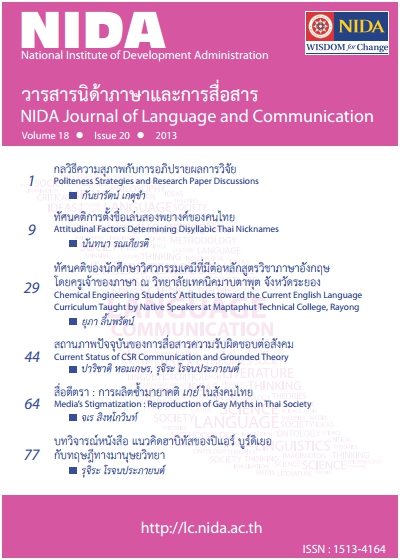Current Status of CSR Communication and Grounded Theory
Keywords:
Grounded theory, CSR communication, CSR, Communication modelAbstract
Based on Stamp’s study (1999), Aqualitatively constructed interpersonal communication model: a grounded theory analysis, this inquiry aims to identify and describe the direction and the current status of research projects, in particular master’s theses and independent studies, on corporate social responsibility (CSR) communication in Thailand over the past two decades. Ninety four research projects were qualified for analysis.
Two research questions guiding the study were: 1) What are the characteristics of the research projects on CSR communication in Thailand in 1998-2012?; and 2) What is the model underpinning the research projects on CSR communication in Thailand in 1998-2012, based on the Grounded Theory?
The findings reveal that the research projects on CSR communication consisted of 8 characteristics: 1) Implementation and CSR communication, 2) CSR communication from the receivers’ perspectives, 3) Influence of CSR communication, 4) CSR communication from the senders’ perspectives, 5) CSR communication and information disclosure, 6) Impacts of CSR communication, 7) Congruency of CSR communication and the other related issues, and 8) CSR communication and knowledge management. The model emerging from the analysis was found to consist exclusively of the Sender-Message-Channel-Receiver (S-M-C-R) structural pattern, which reflects a major constraint and limitation in CSR communication research in Thailand.
Recommendation is made that future research on CSR communication in Thailand should go beyond the (S-M-C-R) structural pattern.
Downloads
How to Cite
Issue
Section
License
By submitting a manuscript, the author transfers the copyright for the article to School of Language and Communication, National Institute of Development Administration (NIDA), if and when the manuscript is accepted for publication. Though the journal is an open-access, reproduction of any material published in NIDA Journal of Language and Communication for non-personal and/or commercial purpose requires a written permission from School of Language and Communication, National Institute of Development Administration (NIDA).






